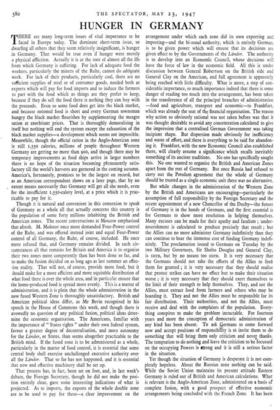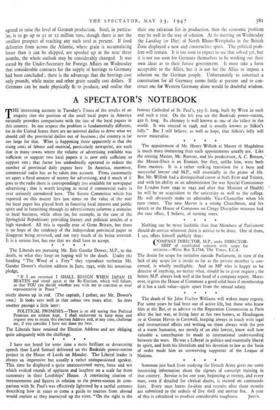HUNGER IN GERMANY HERE are many long-term issues of vital
importance to be T faced in Europe today. The dominant short-term issue, so dwarfing all others that they seem relatively insignificant, is hunger in Germany. That would be true even if hunger were merely a physical affliction. Actually it is at the root of almost all the ills from which Germany is suffering. For lack of adequate food the workers, particularly the miners of the Ruhr, cannot do adequate work. For lack of their products, particularly coal, there are no sufficient supplies of steel or of consumer goods, needed both as exports which will pay for food imports and to induce the farmers to part with the food which as things are they prefer to keep, because if they do sell the food there is nothing they can buy with the proceeds. Even so some food does get into the black market, and because rationed food is short and every German townsman hungry the black market flourishes by supplementing the meagre ration at exorbitant prices. That is thoroughly demoralising in itself but nothing will end the system except the exhaustion _of the black market supplies—a development which seems not impossible. Meanwhile, though the official ration in the Anglo-American zone is still 1,55o calories, millions of people throughout Western Germany are getting no more than goo, and though there may be temporary improvements as food ships arrive in larger numbers there is no hope of the situation becoming permanently satis- factory till the world's harvests are garnered in the coming autumn. America's, fortunately, promises to be the largest on record, but as an American correspondent shows on a later page, that by no , extent means necessarily that Germany will get all she needs, even for the insufficient 1,550-calory level, at a price which it is prac- ticable to pay for it.
Though it is natural and convenient in this connexion to speak of Germany as a whole all that actually concerns this country is the population of some forty millions inhabiting the British and American zones. The recent conversations at Moscow emphasised that afresh. M. Molotov once more demanded Four-Power control of the Ruhr, and was offered instead joint and equal Four-Power control of all Germany, the Ruhr, of course, included. He once more refused that, and Germany remains divided. In such cir- cumstances all that remains for Britain and America is to organise their two zones more competently than has been done so far, and to make the fusion decided on as long ago as last summer an effec- tive reality. That will not, of course, provide more food, but it should make for a more efficient and more equitable distribution of what food there is over the whole area, and in particular ensure that the home-produced food is spread more evenly. This is a matter of administration, and it is plain that the whole administration in the now fused Western Zone is thoroughly unsatisfactory. British and American political ideas differ, as Mr Bevin recognised in his speech in the House of Commons this week, and though there is avowedly no question of any political fusion, political ideas deter- mine the economic organisation. The Americans, familiar with the importance of " States rights " under their own federal system, favour a greater degree of decentralisation, and more autonomy for the Lander, or States, than seems altogether practicable to the British mind. If the fused zone is to be administered as a whole, particularly in the matter of food control, it is essential that some central body shall exercise unchallenged executive authority over all the Lander. That so far has not happened, and it is essential that new and effective machinery shall be set up.
That process has, in fact, been set on foot, and, in last week's debate, the Foreign Secretary, though he did not make the posi- tion entirely clear, gave some interesting indications of what is projected. As to imports, the exports of the whole double zone are to be used to pay for these—a clear improvement on the arrangement under which each zone did its own exporting and importing—and the bi-zonal authority, which is entirely German, is to be given power which will ensure that its decisions are given effect to by the Governments of the Lander. The authority is to develop into an Economic Council, whose decisions will have the force of law in the economic field. All this is under discussion between General Robertson on the British side and General Clay on the American, and full agreement is apparently being reached with little difficulty. What is more, a step of con- siderable importance, so much importance indeed that there is some danger of reading too much into the arrangement, has been taken in the transference of all the principal branches of administration —food and agriculture, transport and economic—to Frankfurt, which was already the seat of the financial organisation. The reason why action so obviously rational was not taken before was that it was thought desirable to avoid any concentration calculated to give the impression that a centralised German Government was taking incipient shape. But dispersion made obviously for inefficiency and waste of effort, and.there is everything to be said for abandon- ing it. Frankfurt, with the new Economic Council also established there, will clearly assume a significance which recalls inevitably something of its ancient traditions. No one has specifically sought this. No one wanted to organise the British and American Zones apart from the rest of Germany. But once Russia had refused to carry out the Potsdam agreement that the whole of Germany should be treated as a single economic unit there was no alternative.
But while changes in the administration of the Western Zone by the British and Americans are encouraging—particularly the assumption of full responsibility by the Foreign Secretary and the recent appointment of a new Chancellor of the Duchy—the future of Germany is in the hands of Germans, and the first essential is for Germans to show more resolution in helping themselves. Many excuses can be made for their apathy and fatalism ; under- nourishment is calculated to produce precisely that result ; but the Allies can no more administer Germany indefinitely than they can continue to bear the immense cost of feeding Germany indefi- nitely. The proclamation issued to Germans on Tuesday by the two Military Governors, Sir Sholto Douglas and General Clay, is stern, but by no means too stern. It is very necessary that the Germans should not take the efforts of the Allies to feed them for granted ; it is very necessary that they should realise that protest strikes can have no effect but to make their situation worse ; - it is very necessary that they should exert themselves to the limit of their strength to help themselves. They, and not the Allies, must extract food from farmers and others who may be hoarding it. They and not the Allies must be responsible for its fair distribution. Their authorities, and not the Allies, must receive and deal with the complaints of the population. Every- thing conspires to make the problem intractable. For fourteen -years and more the conception of democratic administration of any kind has been absent. To ask Germans to come forward now and accept positions of responsibility is to invite them to do something that will bring them only criticism and never thanks. The temptation to do nothing and leave the criticism to be focussed on the occupying Powers is strong and it is still a serious factor in the situation.
Yet though the situation of Germany is desperate it is not com- pletely hopeless. About the Russian zone nothing can be said. While the Soviet Union maintains its present attitude Eastern Germany is ruled out of British and American calculations. What is relevant is the Anglo-American Zone, administered on a basis of complete fusion, with a good prospect of effective economic arrangements being concluded with the French Zone. It has been agreed to raise the level of Germair production. Steel, in particu- lar, is to go up to II or 12 million tons, though there is not the smallest prospect of reaching any such total at present. If food deliveries from across the Atlantic, where grain is accumulating faster than it can be shipped, are speeded up in the next three months, the whole outlook may be considerably changed. It was stated by the Under-Secretary for Foreign Affairs on Wednesday that considerable contracts for the supply of herrings to Germany had been concluded ; there is the advantage that the herrings cost only pounds, while maize and other grain usually cost dollars. If Germans can be made physically fit to produce, and realise that their one salvation lies in production, then the economic problem may be well in the way of solution. At its meeting on Wednesday the 14ndtag (or Diet) of North Rhine-Westphalia in the British Zone displayed a new and constructive spirit. The political prob- lem will remain. It is too soon to expect to see that solved yet, but it is not too soon for Germans themselves to be working out their own ideas as to their future government. It must take a form acceptable to the Allies, but it is not for the Allies to impose a solution on the Gerinan people. Unfortunately to construct a constitution for all Germany seems futile at present and to con- struct one for Western Germany alone would be doubtful wisdom.



































 Previous page
Previous page